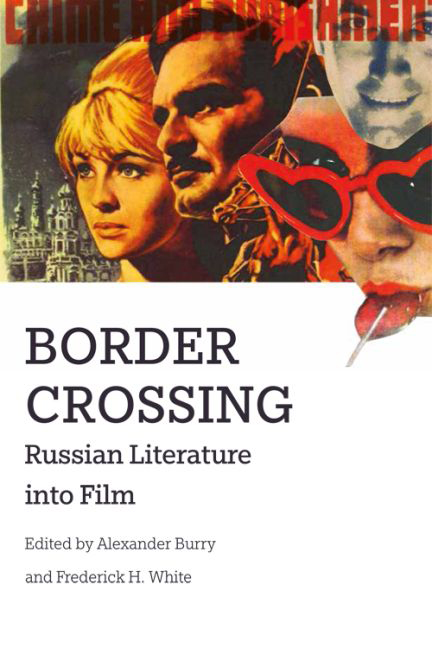Book contents
- Frontmatter
- Contents
- List of Figures
- Notes on the Contributors
- Introduction: Filming Russian Classics—Challenges and Opportunities
- 1 Across the Russian Border
- 2 Dostoevskii's “White Nights”: The Dreamer Goes Abroad
- 3 On Not Showing Dostoevskii's Work: Robert Bresson's Pickpocket
- 4 Stealing the Scene: Crime as Confession in Robert Bresson's Pickpocket
- 5 The Eye-deology of Trauma: Killing Anna Karenina Softly
- 6 “A Vicious Circle”: Karen Shakhnazarov's Ward no. 6
- 7 A Slap in the Face of American Taste: Transporting He Who Gets Slapped to American Audiences
- 8 Against Adaptation? The Strange Case of (Pod) Poruchik Kizhe
- 9 Chasing the Wealth: The Americanization of Il'f and Petrov's The Twelve Chairs
- 10 Fassbinder's Nabokov—From Text to Action: Repressed Homosexuality, Provocative Jewishness, and Anti-German Sentiment
- 11 “The Soviet Abroad (That We Lost)”: The Fate of Vasilii Aksenov's Cult Novel A Starry Ticket on Paper and on Screen
- Conclusion: Passport Control—Departing on a Cinematic Journey
- Bibliography
- Filmography
- Index
7 - A Slap in the Face of American Taste: Transporting He Who Gets Slapped to American Audiences
- Frontmatter
- Contents
- List of Figures
- Notes on the Contributors
- Introduction: Filming Russian Classics—Challenges and Opportunities
- 1 Across the Russian Border
- 2 Dostoevskii's “White Nights”: The Dreamer Goes Abroad
- 3 On Not Showing Dostoevskii's Work: Robert Bresson's Pickpocket
- 4 Stealing the Scene: Crime as Confession in Robert Bresson's Pickpocket
- 5 The Eye-deology of Trauma: Killing Anna Karenina Softly
- 6 “A Vicious Circle”: Karen Shakhnazarov's Ward no. 6
- 7 A Slap in the Face of American Taste: Transporting He Who Gets Slapped to American Audiences
- 8 Against Adaptation? The Strange Case of (Pod) Poruchik Kizhe
- 9 Chasing the Wealth: The Americanization of Il'f and Petrov's The Twelve Chairs
- 10 Fassbinder's Nabokov—From Text to Action: Repressed Homosexuality, Provocative Jewishness, and Anti-German Sentiment
- 11 “The Soviet Abroad (That We Lost)”: The Fate of Vasilii Aksenov's Cult Novel A Starry Ticket on Paper and on Screen
- Conclusion: Passport Control—Departing on a Cinematic Journey
- Bibliography
- Filmography
- Index
Summary
In 1915, the author and playwright Leonid Andreev debuted his play He Who Gets Slapped at the Moscow Art Theater. In the following years, this dramatic work about a vanquished intellectual-turned-circus-clown, more than any of his twenty other plays, achieved spectacular success among American audiences, first as a play in English translation, then when adapted for the silver screen, then as a novel and, finally, as an opera. Andreev had argued in his “Letters on the Theater” that cinema would become the place for action and spectacle, diminishing the popularity of the realist theater. Not surprisingly then, a love affair, betrayal, and humiliation are all vividly on display at the outset of Victor Sjöström's He Who Gets Slapped (1924). At the end of Sjöström's cinematic adaptation, the villains are devoured by a ferocious lion, just the type of spectacle that Andreev had predicted would be possible in the medium of film. Yet, Andreev could not have anticipated a novel adaptation by George A. Carlin (1925), which would attempt to capitalize on the play's cinematic success, or an operatic adaptation by Robert Ward and Bernard Stambler (1956), that would focus on the clown's failed search for love. In retrospect, Andreev's play was astonishingly generative and was easily transported across both temporal and spatial borders, entertaining American audiences as a play, film, novel, and opera.
Of particular interest is how Andreev's panpsyche drama—a type of theater that focused on the psychological development of characters rather than on external action—could be successfully transported for American audiences in so many different forms. Most certainly, a partial answer may be found in the rich cultural tradition of the circus. As the French semiotician Paul Bouissac has written, the circus “is a kind of mirror in which the culture is reflected, condensed and at the same time transcended; perhaps the circus seems to stand outside culture only because it is at its very center.”
- Type
- Chapter
- Information
- Border CrossingRussian Literature into Film, pp. 140 - 164Publisher: Edinburgh University PressPrint publication year: 2016

